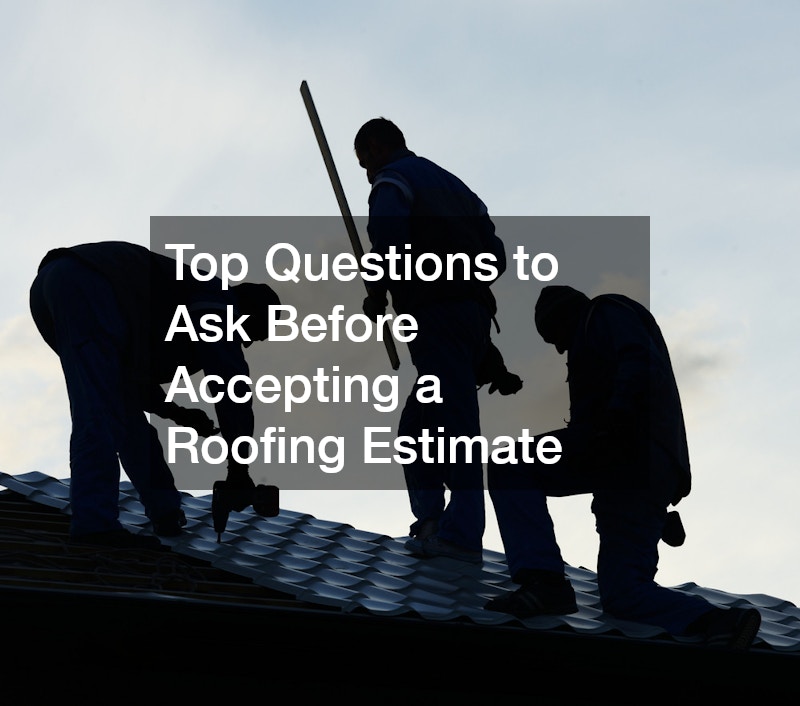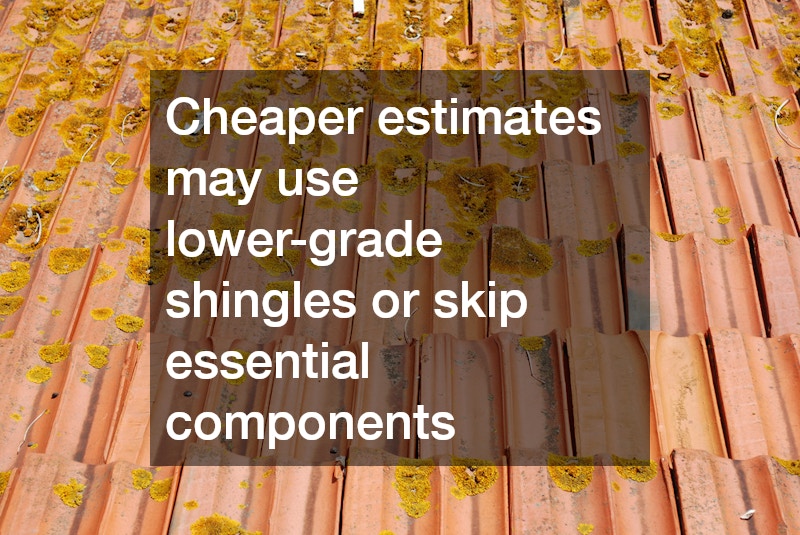Key Takeaways
-
Always request a written roofer estimate rather than relying on verbal quotes to avoid misunderstandings.
-
Verify contractor credentials: licensing, insurance, manufacturer certifications, and references.
-
Clarify the scope of work: materials, decking replacement, debris removal, and additional components like flashing or ventilation.
-
Confirm timeframes and logistics: start date, crew size, weather contingencies, and project management contacts.
-
Understand warranties and guarantees: both manufacturer-backed and workmanship coverage, and what voids the warranty.
-
Compare multiple roofer estimates side by side to evaluate value, not just price.
-
Watch for red flags: suspiciously low bids, pressure tactics, lack of documentation, or poor online reputation.

Roofing work is one of the most significant home improvement projects a homeowner will face. Whether it’s a full roof replacement, repairing storm damage, or upgrading materials for better energy efficiency, the process starts with roofer estimates. These documents are more than just numbers on a page—they set expectations about costs, materials, timelines, and guarantees. Unfortunately, many homeowners focus only on the bottom line without realizing how much critical information is buried—or missing—in the details.
Accepting the first roofer estimate without asking questions can lead to costly surprises. Some roofing contractors may provide vague language, skip over necessary permits, or leave out potential add-ons that surface only after the project begins. Others may present a suspiciously low figure designed to win your business but later hit you with hidden fees. To make a truly informed decision, you need to dig deeper.
This article explores the top questions to ask before signing off on any roofer estimates. From checking contractor credentials and clarifying the scope of work to understanding warranties and comparing multiple bids, you’ll gain the tools to protect your budget, your home, and your peace of mind when you work with your residential roofer.
Understanding the Basics of a Roofing Estimate
At its core, a roofing estimate is a proposal that explains how a contractor plans to complete your project and what it will cost. However, not all roofer estimates are created equal. Some are highly detailed with clear breakdowns, while others only provide a lump sum figure. Knowing the difference is essential for homeowners who want transparency and accuracy.
A professional roofer estimate should include the following components:
-
Material details: Specific brands, grades, and quantities of shingles, underlayment, flashing, vents, and sealants. Cheaper estimates may list generic materials without warranty coverage, while detailed estimates will specify products backed by manufacturers.
-
Labor costs: The cost of skilled installation, removal of old roofing, and specialized tasks like installing new flashing or addressing ventilation issues.
-
Permits and compliance: Roofing jobs often require city or county permits. Reputable contractors include this in their roofer estimates, saving homeowners from surprise fees or code violations.
-
Waste removal and cleanup: A complete estimate should cover dumpsters, debris hauling, and cleanup. Contractors who skip this line item may leave homeowners with unexpected disposal costs.
-
Warranties and guarantees: Clear information about workmanship warranties and manufacturer-backed protections.
Another key distinction is between a “quote” and a detailed roofer estimate. Quotes are often verbal or written as a single figure, offering little transparency. Proper estimates, on the other hand, provide an itemized document you can compare across contractors. Always insist on a written, detailed roofer estimate—it provides a legal reference point if disputes arise later.
Questions About Contractor Credentials
Even the most detailed roofer estimates are worthless if the contractor lacks the credentials to back them up. Hiring an unqualified roofer can lead to poor workmanship, invalid warranties, or even liability issues if accidents occur on your property. Credentials prove professionalism, accountability, and long-term commitment to the trade.
Key questions every homeowner should ask include:
-
Are you licensed in this state or locality?
Licensing verifies that the contractor has met the region’s legal requirements. A roofer without proper licensing could face fines, and your project may fail inspections. -
Do you carry general liability and workers’ compensation insurance?
Insurance protects homeowners from paying out of pocket for accidents, injuries, or property damage. Reputable roofer estimates should clearly state that the company is insured and willing to provide proof. -
Can you provide references and a portfolio?
Contractors who stand by their work can share customer testimonials and photos of past jobs. Speaking with previous clients can reveal whether estimates matched final costs and whether deadlines were honored. -
Are you certified by roofing material manufacturers?
Manufacturer certifications indicate that the roofer has been trained to install specific products. Certified contractors can often offer longer manufacturer warranties, giving your project added protection.
Warning signs to watch for:
-
A roofer who avoids discussing insurance or licensing.
-
Lack of a permanent business address or only providing a cell phone number.
-
Pressuring you to pay large deposits before work begins.
A roofer estimate backed by strong credentials means you’re hiring a contractor who’s more likely to deliver on their promises.
Questions About the Scope of Work
The scope of work defines what exactly you’re paying for. Without clear details, roofer estimates can leave major gaps, creating room for hidden fees or misunderstandings. Asking detailed questions ensures you know what’s included—and what isn’t.
Important clarifications include:
-
Old roof removal: Does the estimate include tearing off the existing roof or simply layering new shingles on top? Overlaying may save money upfront but can hide serious problems like rotting decking.
-
Material specifics: Does the roofer list the type and thickness of underlayment, flashing details, ventilation systems, and fasteners? Transparent roofer estimates will itemize each material instead of bundling them under vague terms.
-
Decking replacement: How will damaged decking be handled if discovered during the project? Some contractors charge extra per sheet of plywood, and you should know those rates in advance.
-
Debris management: Does the roofer provide dumpsters, daily cleanup, and final inspection for nails and debris? Poor debris management can damage landscaping or create hazards.
-
Additional components: Will the estimate include chimney flashing, ridge caps, or gutters if needed? Missing these details can inflate your final bill.
Asking these questions ensures that you’re comparing apples to apples when reviewing roofer estimates from different contractors. The more specific the scope of work, the fewer surprises you’ll face during construction.
Questions About Timeframes and Project Logistics
Roofing is disruptive, and poorly managed timelines can make the experience stressful. A reliable roofer estimate should provide a realistic schedule along with clear communication about project logistics.
Questions to ask include:
-
When can the project start, and how long will it take?
Depending on roof size and complexity, most projects take 1–3 days. Large or custom roofs may take longer. Ask for a start date and projected completion date in writing. -
How many crew members will be assigned?
The number of workers directly affects how quickly the job will be finished. A roofer estimate that only promises a quick turnaround without explaining crew size may be unrealistic. -
What happens if bad weather hits?
Ask about the contractor’s procedures for securing your home in case of rain or storms. A professional roofer should explain how they’ll tarp exposed areas and reschedule without compromising quality. -
Who is my point of contact?
Larger companies often assign a project manager. Having one consistent contact makes communication smoother and prevents miscommunication between crews and homeowners.
Other logistical considerations:
-
Will workers need access to your driveway, garage, or yard?
-
How will noise and dust be managed?
-
Will daily progress updates be provided?
By addressing these issues before signing roofer estimates, you’ll avoid frustration and ensure accountability.
Questions About Warranties and Guarantees
Even the best-looking roof can fail if materials are defective or workmanship is poor. This is where warranties become critical. Asking the right warranty questions ensures your investment is protected.
Types of warranties to clarify:
-
Manufacturer warranties: Cover shingles and other materials. Some last 20 years, while premium products can be backed for 50 years or more. Check whether warranties are prorated, meaning coverage decreases over time.
-
Workmanship warranties: Provided by the contractor, covering installation errors. These can range from 1 year to 15 years depending on the roofer.
Questions to ask about warranties:
-
What materials are covered, and for how long?
-
Does the roofer estimate include both material and labor warranties?
-
What conditions void the warranty (such as poor ventilation or unapproved modifications)?
-
Can the warranty be transferred to the next homeowner?
Always get warranties in writing. Contractors who hesitate to provide this documentation may not stand by their work. Strong warranty coverage adds real value to roofer estimates because it protects you long after the crew leaves.

Comparing Multiple Estimates Effectively
It’s tempting to choose the cheapest roofer estimate, but doing so without a side-by-side comparison can be a costly mistake. The goal is not just to find the lowest price but to find the best value.
How to compare roofer estimates:
-
Scope of work: Ensure each estimate covers the same tasks. One roofer may include full tear-off and decking replacement, while another does not.
-
Materials: Compare brands, grades, and warranties. Cheaper estimates may use lower-grade shingles or skip essential components like ice and water shields.
-
Labor: Look for clarity in how labor is priced. An estimate that significantly underbids labor may cut corners or use unskilled workers.
-
Credentials: Check for differences in certifications, licenses, and insurance coverage.
-
Professionalism: Evaluate how detailed the roofer estimates are. A professional, organized estimate often reflects the contractor’s overall approach.
Requesting at least three estimates gives you a realistic range of costs and services. A detailed checklist can help you line up differences and see which contractor offers the best overall value.
Red Flags That Should Make You Walk Away
While many contractors provide honest, detailed roofer estimates, others use them as bait to win jobs with questionable practices. Protect yourself by recognizing these warning signs:
-
Estimates that are far below the market average without explanation.
-
Contractors unwilling to show proof of insurance or licenses.
-
No written documentation, only verbal promises.
-
High-pressure tactics such as “today only” discounts.
-
Poor reviews or lack of online presence.
If you encounter any of these red flags, trust your instincts and move on. A reliable contractor will never pressure you—they’ll rely on transparency and professionalism to earn your trust.
Accepting a roofing estimate isn’t just about signing a contract—it’s about protecting your home, your budget, and your peace of mind. Roofer estimates should serve as clear, detailed roadmaps, outlining every step of the project from materials and labor to cleanup and warranties. The most important step homeowners can take is to ask the right questions before committing.
By confirming contractor credentials, clarifying the scope of work, understanding timelines, and ensuring strong warranties, you’ll filter out unreliable contractors and avoid unexpected expenses. Comparing multiple roofer estimates side by side allows you to see beyond the numbers and focus on real value.
Remember, the cheapest option is rarely the best when it comes to roofing. A trustworthy roofer estimate isn’t just a price—it’s a promise of quality, accountability, and protection for your home. Take the time to ask questions now, and you’ll enjoy a durable roof that safeguards your home for decade